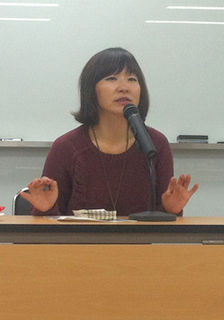Related Research Articles
Ahn Junghyo is a South Korean novelist and literary translator.
Yoo Hyeonjong is a South Korean novelist whose works of dramatic historical fiction are well known in his native country.

Kim Hoon is a South Korean novelist, journalist and critic.

Jo Jeong-rae is a novelist from South Korea, best known as the author of the best-selling novels Taebaek Mountain Range, Arirang, and Han River'

Gong Jiyeong is a South Korean novelist.

Eun Heekyung is a South Korean writer.
Choi Suchol is a Korean author.
Hailji is a modern South Korean writer whose series of "Racetrack" novels created controversy in Korea.
Jang Jeongil is a South Korean poet, playwright, and novelist.
Jon Kyongnin is a Korean author best known for her poetry on the theme of sexuality.
Yi Hocheol was a South Korean writer who won several awards.
Yi Sunwon is a modern South Korean writer who writes about diverse topics.

Yi Cheong-jun was a prominent South Korean novelist. Throughout his four decade-long career, Yi wrote more than 100 short stories and 13 novels.
Jeon Sang-guk is a South Korean writer known for his masculine writing style.
Kim Wonu is a modern South Korean novelist.
Lee SungBoo was a South Korean poet and novelist.

Lee Ze-ha is a South Korean writer, poet and painter.
Park Taewon was a modern South Korean writer who moved to North Korea.
Song Yeong was a South Korean modern writer.
Lee Eung Jun is a South Korean writer. He debuted as a poet in 1990 when the quarterly journal Literature & Criticism published his poem “Kkaedareumeun gapjagi chajaonda”. In 1994 his short story “Geuneun chueogui sokdoro georeogatda” appeared in the journal Imagination, marking the beginning of his career as a novelist. He has been noted for his portrayal of South Korean youths living through the 1990s. His characters tend to perceive pain over pleasure, sadness over joy, and solitude over companionship. Lee also writes screenplays and directs his own work. His cinematic flair is reflected in his novels.
References
- ↑ "Bok Geo-il" biographical PDF available at LTI Korea Library or online at: "Author Database - Korea Literature Translation Institute". Archived from the original on 2013-09-21. Retrieved 2013-09-03.
- 1 2 3 "Bok Geo-il" LTI Korea Datasheet available at LTI Korea Library or online at: "Author Database - Korea Literature Translation Institute". Archived from the original on 2013-09-21. Retrieved 2013-09-03.
- 1 2 Lee, Kyung-ho (1996). "Bok, Geo-il". Who's Who in Korean Literature. Seoul: Hollym. pp. 24?25. ISBN 1-56591-066-4.
- ↑ Korean Writers The Novelists. Minumsa Press. 2005. p. 20.
- ↑ Korean Writers The Novelists. Minumsa Press. 2005. p. 21.